
Many pet owners say that having a dog is like having a toddler in the home. Interestingly, that’s where most poisonings occur. The majority are accidental. Canines are more likely to get in trouble than felines, accounting for up to 80% of cases. Dogs won’t hesitate to eat anything they find, whereas cats are typically choosier about what they consume.
It’s worth mentioning from the get-go that our pets aren’t little people. Just because you can eat most of the things on our list doesn’t mean your dog can. Sadly, ingesting some of these things can lead to severe or even life-threatening results.
25 Dangerous Foods That Your Dog Shouldn’t Eat
1. Chocolate

Three ingredients in chocolate can cause poisoning: methylxanthines, theobromine, and caffeine. Unsurprisingly, many cases of accidental ingestion occur during the holidays. The first one is the biggest problem, but all are problematic. The darker the chocolate, the more serious the results. Methylxanthine can cause issues with central nervous system (CNS) function and cardiac arrhythmias.
Less than 1 ounce can be fatal. You may see signs in as little as 6 hours. They include extreme thirst, GI distress, hyperactivity, and vomiting, followed by seizures and, ultimately, death if untreated.
2. Raisins & Grapes
The toxicity of raisins and grapes stems from their tartaric acid content. It is the most prevalent acid in these fruits. Ingestion by dogs can cause liver damage and kidney failure. Signs are evident within 24 hours, often sooner. They include lethargy, tremors, weakness, and vomiting. Kidney failure occurs within 72 hours of ingestion, necessitating the euthanasia of the pet.
3. Citrus Fruits
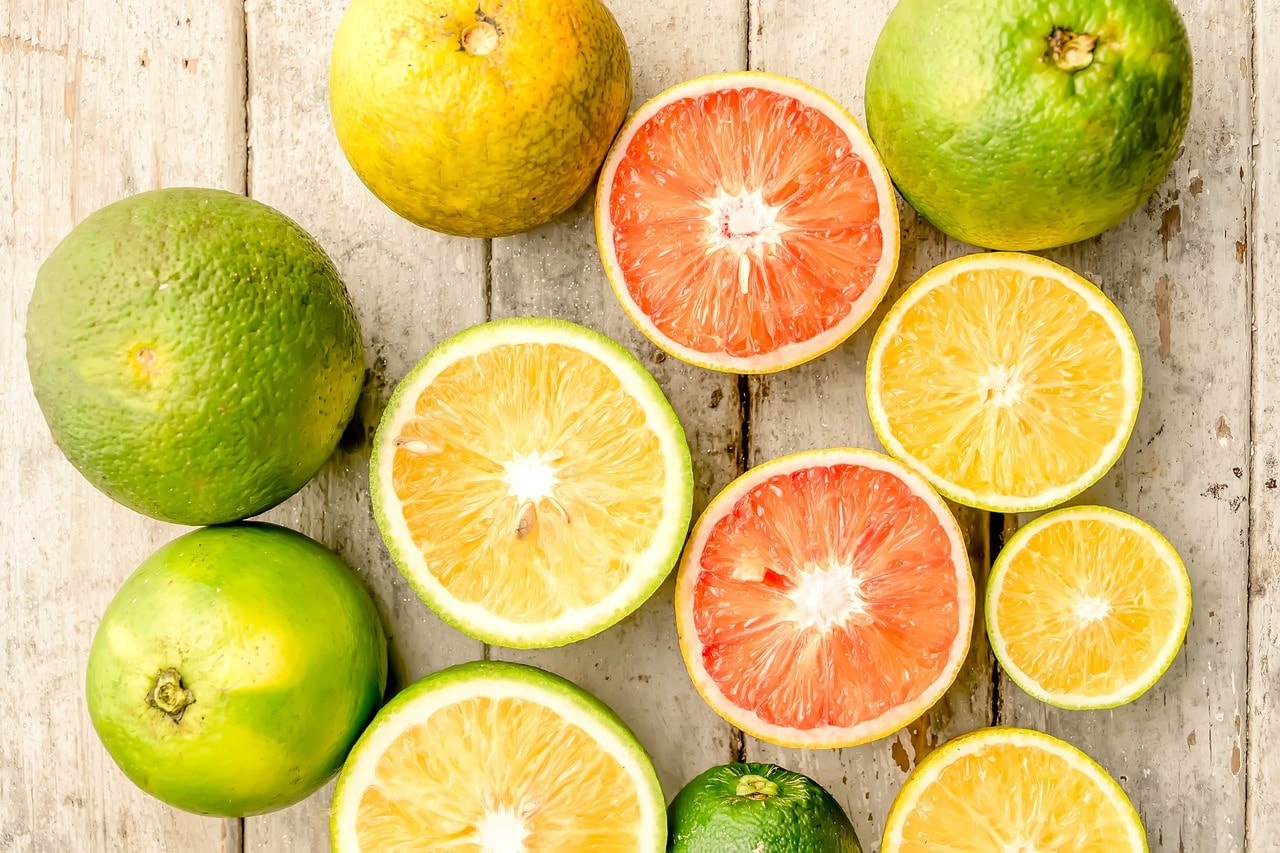
The toxicity of citrus fruits, like grapefruits, oranges, and lemons, also involves an acid called citric acid. It’s a significant contributor to a food’s pH. For example, lemon juice is highly acidic, with a pH of 2.0–2.6. These fruits can irritate your pup’s mouth and the lining of their digestive system. It can also sicken your pet, causing vomiting, and impair the function of their central nervous system.
4. Starfruit
The starfruit is the quintessential exotic fruit. Hailing from Southeast Asia, it is delicious and relatively low in sugar. Unfortunately, it can be problematic for dogs and people. It can cause kidney issues, particularly for those with pre-existing conditions. It can interfere with medication uptake, making it inadvisable for pets on prescription drugs. Starfruit can also cause confusion, and nausea, at least in people.
5. Fruit Pits

It may surprise you to learn that popular fruits like apricots, cherries, peaches, and apples can be poisonous if you eat the pits. They contain a chemical called amygdalin. If the pits are chewed, they can trigger a reaction in a dog—or human—because it releases cyanide. It doesn’t take a lot of it to cause weakness, vomiting, respiratory distress, and death by interfering with the ability to use oxygen.
6. Foods High in Oxalic Acid
Oxalic acid is the proverbial double-edged sword. It exists in highly nutritious foods, like almonds, tofu, and spinach. However, it can bind with magnesium or calcium and become oxalate crystals. That’s where the trouble starts since it can cause drastic and dangerous drops in these minerals. Calcium oxalate can lead to kidney damage.
7. Garlic, Onion, Leeks, Green Onions, & Chives
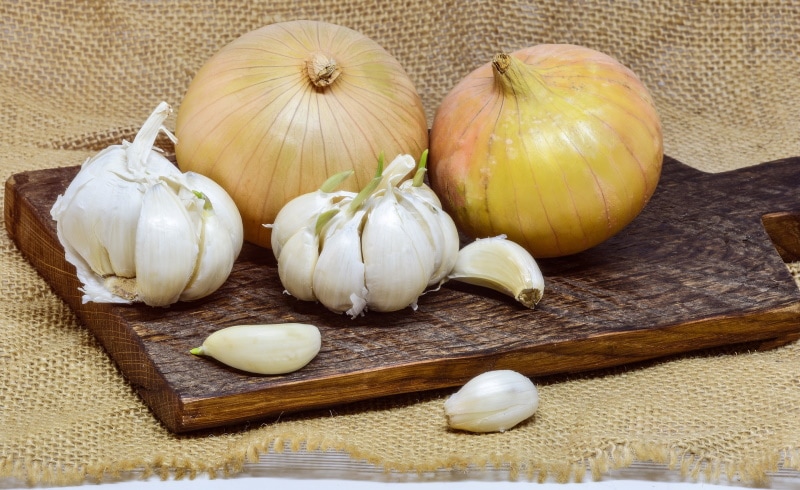
Onion is the worst one of the lot. The problem arises from each vegetable’s content of aliphatic sulfides and sulfoxides. These chemicals can cause Heinz body anemia, which leads to the destruction of red blood cells. Only 15–30 g/kg is needed to lead to toxicity.
8. Avocado
Avocados being on the list might surprise you. Other than the large pit and its fat content, it doesn’t seem like a harmful food. It’s an example of the varying sensitivities of different animals. The culprit, in this case, is a toxin called persin. Ingestion can cause nausea and vomiting. It can also potentially cause heart damage.
9. Mustard

Mustard is made of the ground seeds of the plant. It contains a chemical compound called isothiocyanate. It’s also found in cruciferous vegetables, such as kale and broccoli. Ingesting too much of this chemical can irritate your pup’s stomach and cause gastroenteritis. Signs of poisoning include abdominal pain, vomiting, and drooling.
10. Bones
We all have the classic image in our heads of a dog chewing happily on a bone. Unfortunately, it can also lead to problems, particularly if it splinters. A pet may hurt their mouth or damage their teeth when chewing on bones. If they swallow any shards or pieces, it can lead to a gastrointestinal blockage, making it a medical emergency. We don’t doubt that your dog would love to chew on a bone; however, it’s not worth the risk.
11. Spicy Foods

This one should be a no-brainer. The substance behind the heat of spicy food is called capsaicin. Research has shown it triggers a pain response in dogs. It can also increase their heart rate. Therefore, you should never offer your pet spicy foods of any kind.
12. Cinnamon & Nutmeg
These spices are toxic to dogs in large amounts. Ingesting cinnamon can lead to respiratory distress, vomiting, and low blood pressure. Nutmeg has the opposite effects from a chemical called myristicin. A small bit can cause nausea. However, it can also lead to high blood pressure, disorientation, and hallucinations. The effects can last up to 48 hours.
13. Baked Goods

Baked goods are potentially harmful partially because of the spices we discussed. There’s also the fat and sugar content to consider. Even a single mini-donut has about 60 calories. That’s a hefty chunk in a 10-pound dog’s recommended daily intake of 275 calories. Obesity is a serious health issue and can increase your pet’s risk of heart disease and diabetes.
14. Xylitol-Containing Candies & Gum
Xylitol is a natural sweetener you’ll find in many products. However, it’s toxic to dogs on two fronts. First, it can trigger spikes in the animal’s liver enzymes, which can potentially cause damage or liver failure. Second, xylitol leads to a chain reaction with an increase in insulin and a subsequent drop in blood sugar. An affected pet will be weak, vomit, and may even have seizures. Vet intervention is required.
15. Macadamia Nuts
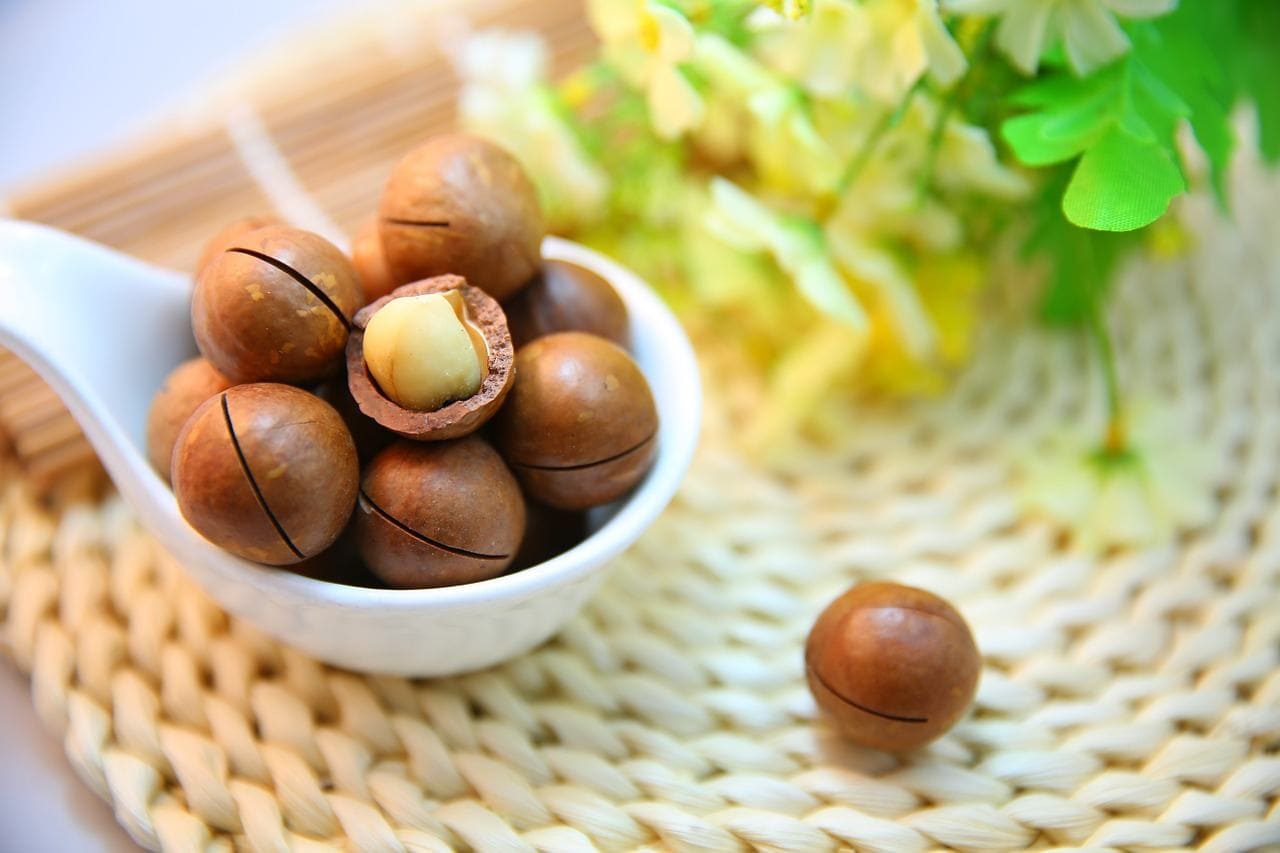
The precise cause of the toxicity of macadamias is unknown. However, dogs that ingest these nuts experience vomiting, tremors, and marked weakness within 12 hours. Your vet may treat your dog with pain meds and IV fluids in severe cases, but most dogs recover within 48 hours.
16. Salty Snacks
Sodium is the problem with these foods. Dogs don’t need much sodium in their diets. An adult only needs 0.2 grams daily. Eating too much salty food can lead to salt toxicosis, especially if the pet doesn’t have access to fresh water. Signs include GI distress, vomiting, and seizures. Even though canines can tolerate salt, we strongly urge you not to give these snacks to your pet.
17. Alcohol

Consuming alcohol in any form can induce ethanol toxicosis, which can affect the central nervous system. Canines are particularly sensitive to it. Ingesting causes lethargy, GI distress, and vomiting. An affected animal may also have difficulty breathing. Left untreated, it can lead to more severe consequences and even death. It’s also worth noting that hops in beer are equally dangerous for dogs.
18. Caffeine-Containing Beverages
Caffeine-containing beverages include the same methylxanthines that make chocolate toxic for pets. These chemicals can cause vomiting and diarrhea. Caffeine can also affect heart function. Signs usually begin within 2 hours. They can rapidly progress to more serious effects, such as loss of coordination, seizures, and death.
19. Dairy Products
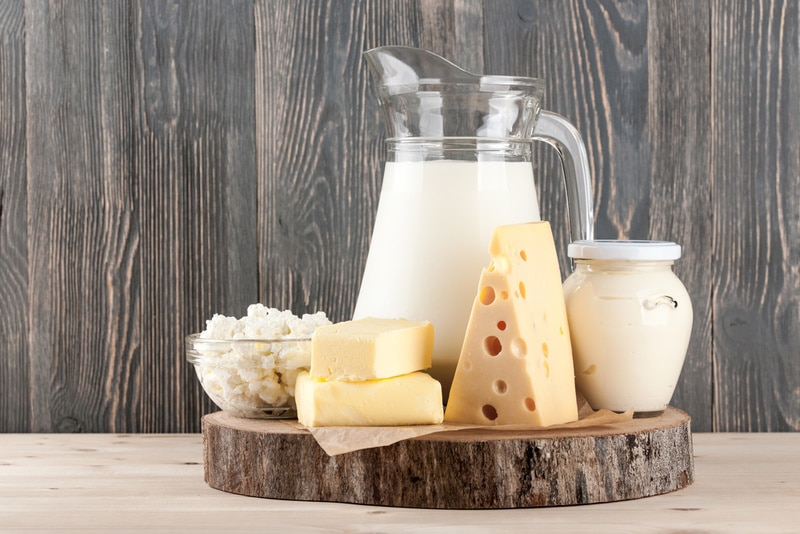
When you eat dairy products, your body taps into your stores of an enzyme called lactase to break down the sugars. It’s the same with your dog. However, canines, like people, produce less of this chemical as they age. Many dogs become lactose-intolerant, so ingesting dairy products can induce abdominal pain, vomiting, and diarrhea.
20. Raw or Undercooked Food
Raw or undercooked food can contain harmful bacteria like Salmonella, which can cause foodborne illnesses in dogs and people. It’s not just a matter of cleaning up after feeding your pet. You must disinfect everything you use to prepare these foods. Therefore, the American Veterinary Medical Association (AVMA) and FDA don’t recommend giving these foods to your pet.
21. Moldy Foods (Mycotoxins)
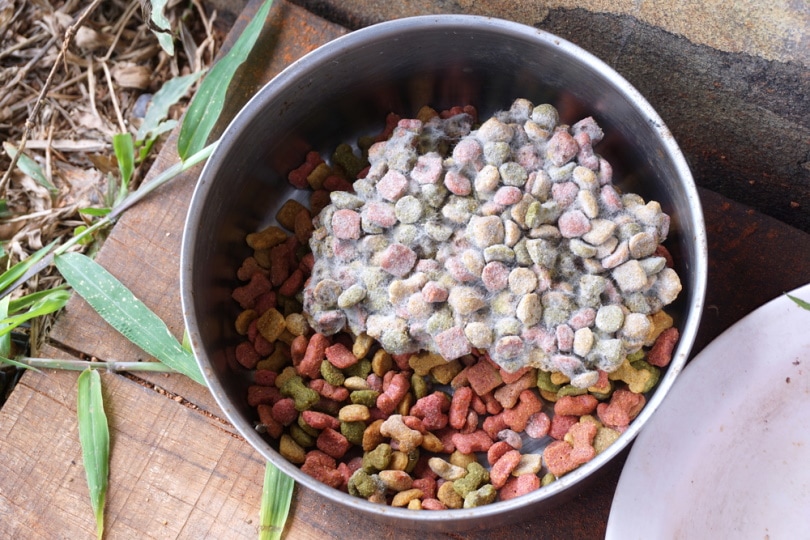
Dogs are known to be indiscriminate when it comes to eating. If something is around, it’s fair game. Unfortunately, ingesting moldy food can expose your pet to harmful mycotoxins, leading to tremorgenic mycotoxicosis. This fungal condition causes vomiting and tremors within hours of ingestion. It’s often difficult to treat, with some pets having tremors their entire lives.
22. Poisonous Plants
Poisonous plants are probably more of an issue for cats. Nevertheless, some contain toxic substances called oxalates, as we discussed earlier. Plants that also have these chemicals include pothos, calla lilies, peace lilies, and philodendrons. We recommend checking a species’ toxicity to pets before bringing them into your home or garden.
23. Cold Medications With Pseudoephedrine
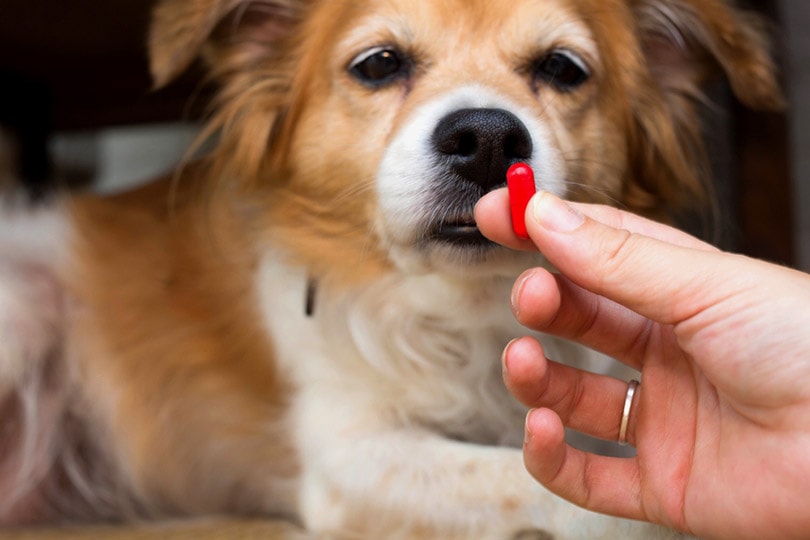
Medications pose serious issues with pets. Drugs containing pseudoephedrine are one of them. While they may alleviate your allergy symptoms, they can prove deadly for dogs. It mainly affects the animal’s nervous system, causing panting, restlessness, and tremors. It can worsen if left untreated. Unfortunately, it doesn’t take much. You should contact your vet immediately if you suspect poisoning.
24. Acetaminophen
It’s hard to see a dog in pain. However, don’t reach for the acetaminophen. Ingesting it can cause facial and paw swelling. It can progress to methemoglobinemia, a condition that impairs the red blood cells’ ability to deliver oxygen. It can also lead to liver damage. Your dog will require immediate care. The treatment is long, particularly if the organ is impacted.
25. Ibuprofen
Ibuprofen presents similar issues as our last entry. It can affect the GI tract, central nervous system, and the kidneys. Initial signs include GI distress and vomiting. Weakness and seizures typically follow. Your vet may suggest inducing your pup to vomit with hydrogen peroxide if it just happened. Otherwise, it is a medical emergency requiring prompt care.
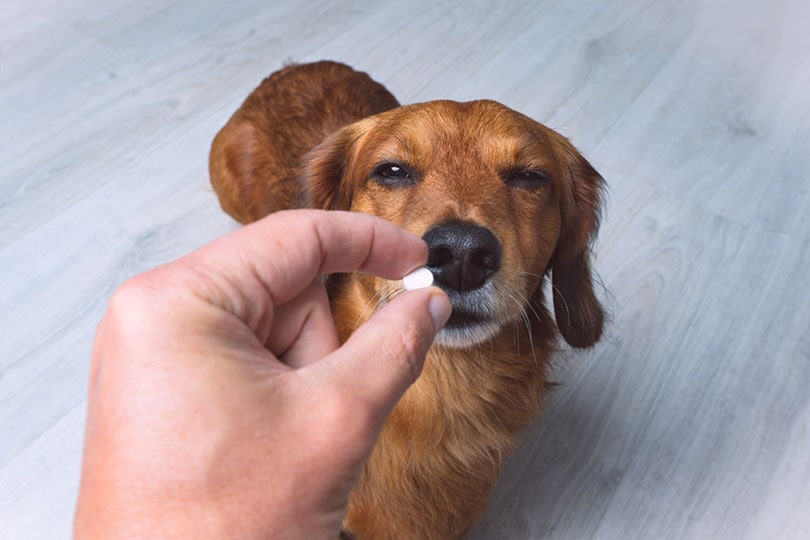
Conclusion
It’s easy to understand why anyone would want to share something tasty with their pet. After all, our dogs are our best friends. However, it’s unwise to make it a habit. Many perfectly safe foods can be harmful or even poisonous to our pets. It’s simply not worth the risk. There are plenty of safer ways to bond with your dog that wouldn’t involve an emergency trip to the vet.
Featured Image Credit: Tetiana Bykovets, Unsplash






